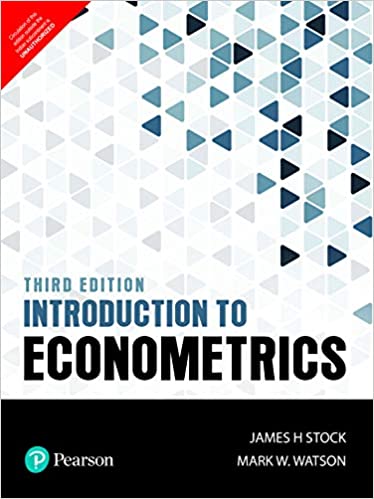
Introduction to Econometrics 3rd Edition by James Stock, Mark Watson
Edition 3ISBN: 978-9352863501
Introduction to Econometrics 3rd Edition by James Stock, Mark Watson
Edition 3ISBN: 978-9352863501 Exercise 21
The demand for a commodity is given by Q = 0 + 1 P + u, where Q denotes quantity, P denotes price, and u denotes factors other than price that determine demand. Supply for the commodity is given by Q = 0 + 1 P + v , where v denotes factors other than price that determine supply. Suppose that u and v both have a mean of zero, have variances
 and
and
 , and are mutually uncorrelated.
, and are mutually uncorrelated.
a. Solve the two simultaneous equations to show how Q and P depend on u and v.
b. Derive the means of P and Q.
c. Derive the variance of P , the variance of Q , and the covariance between Q and P.
d. A random sample of observations of (Q i , P i ) is collected, and Q i is regressed on P i. (That is, Q i is the regressand and P i is the regressor.) Suppose that the sample is very large.
i. Use your answers to (b) and (c) to derive values of the regression coefficients.
ii. A researcher uses the slope of this regression as an estimate of the slope of the demand function ( ß 1 ). Is the estimated slope too large or too small
 and
and  , and are mutually uncorrelated.
, and are mutually uncorrelated.a. Solve the two simultaneous equations to show how Q and P depend on u and v.
b. Derive the means of P and Q.
c. Derive the variance of P , the variance of Q , and the covariance between Q and P.
d. A random sample of observations of (Q i , P i ) is collected, and Q i is regressed on P i. (That is, Q i is the regressand and P i is the regressor.) Suppose that the sample is very large.
i. Use your answers to (b) and (c) to derive values of the regression coefficients.
ii. A researcher uses the slope of this regression as an estimate of the slope of the demand function ( ß 1 ). Is the estimated slope too large or too small
Explanation
a) The equation for quantity demanded is...
Introduction to Econometrics 3rd Edition by James Stock, Mark Watson
Why don’t you like this exercise?
Other Minimum 8 character and maximum 255 character
Character 255


